Crown Street, Wollongong, 2500
Interesting Web Designs in Australia: How to Build Creative Sites Without Overcomplicating
When it comes to building a website, striking the right balance between creativity and simplicity is so important. Sure, it’s tempting to load your site with eye-catching features and fancy effects, but going overboard can actually hurt the user experience. The best web designers know how to blend innovation with functionality, creating web designs that grab attention without overwhelming visitors.
In this blog, we’ll explore how to create engaging and dynamic websites that draw in site visitors while keeping things clean and simple. We’ll break down essential design principles and share practical tips and examples to help you build a website that truly leaves a lasting impression.
What Makes a Website Stand Out?
Your website is often the first impression potential customers have of your brand. An engaging web design not only grabs a user's attention immediately but also sets the tone for your brand’s personality. It can make the difference between a visitor exploring further or bouncing off your site.
Think about it—if a website looks messy or is hard to navigate, most people won’t stick around. Research shows that 38% of users will simply click away if the layout isn’t up to scratch. On the flip side, businesses that invest in well-designed websites have seen a 20-25% boost in conversion rates. It just goes to show that putting thought into your website design isn’t just about looking good—it’s a smart move for your bottom line too!
Australian businesses are increasingly recognising this, often collaborating with website design specialists to stand out in crowded markets. When done right, creative web design boosts engagement, enhances usability, and contributes to stronger brand loyalty.
Understanding the Core Elements of Creative Web Design
Designing a website that is both creative and easy to use can feel like walking a tightrope. You want your own website to stand out with unique features, but going overboard can confuse site visitors and hurt usability.
Below are ten straightforward steps to help you create award-winning website designs that look great and function smoothly, using effective website design ideas and smart web development practices.
1. Prioritise Simple Navigation
Simple navigation is a key element of good website design. To make your site easy to use, limit your menu items to the essentials and organise them logically. Use familiar patterns, such as header menus and footer links, to help visitors find what they need without getting lost. The aim is to guide users smoothly from the homepage to other important pages, keeping the journey intuitive and frustration-free.
2. Use Clean and Consistent Design Elements
Consistency in your website design creates a professional and trustworthy feel. Stick to a limited colour palette—typically three to four colours—and use just one or two fonts throughout your site. Uniform spacing and alignment also contribute to a clean look, ensuring every element on your website homepage design and beyond feels well-placed and intentional. This approach not only enhances visual design but also improves readability and overall user experience.
3. Focus on High-Impact Visuals
Visuals play a huge role in how website visitors perceive your brand. High-quality images, videos, and graphics can make your website more engaging and visually appealing, but be mindful not to overload pages with too many elements. A reliable photo editor can help you optimize images for web use, ensuring they look sharp without slowing down your site. It also allows you to maintain a consistent visual style that reinforces your brand identity.
Use white space strategically to create a balanced design that highlights key content and keeps the overall look clean and inviting. Businesses are increasingly exploring unique themes like black website design to create a bold and sophisticated online presence.
4. Implement Simple and Effective Content
The content on your website should be clear, concise, and easy to digest. Break up large chunks of text with headings, bullet points, and short paragraphs to improve readability. Where possible, use visuals or icons to complement the text and reinforce your message. Well-structured content combined with a clean website design ensures visitors quickly understand what your site is about and find the information they need without hassle.
5. Sparingly Add Interactive Elements
While interactive elements like animations, videos, and hover effects can add a modern touch to your website, it’s important to use them thoughtfully. These features should enhance the user experience, not distract from it. When used sparingly, elements can make your site feel dynamic and engaging, but too many can slow down loading times and overwhelm visitors, particularly on your homepage.

6. Test and Iterate Your Website Design
Once your website is live, testing and refining the design is essential. Test your site’s performance on different devices and browsers to ensure it looks and functions well everywhere. Collect feedback from real users to identify any pain points or areas for improvement. Making small, thoughtful adjustments based on this feedback can significantly enhance the usability and appeal of your website design over time.
7. Prioritise Performance and Usability
A fast and user-friendly website is crucial for retaining visitors. Make sure your web development process includes optimising images and code to improve loading speeds. Additionally, ensure your site is mobile-responsive, meaning it automatically adjusts to fit any screen size. Prioritising performance not only improves the user experience but also boosts your website’s SEO rankings, making it easier for new visitors to find you.
8. Keep It Maintainable
A good website design isn’t just about the initial launch—it’s also about long-term maintenance. Avoid using overly complex code or too many plugins that could become difficult to manage. Document your design choices, such as fonts, colours, and custom elements, to make future updates easier. This approach ensures your website remains fresh, relevant, and simple to maintain as your business evolves.
Exceptional Website Designs You Need to See
Whether it’s showcasing art, promoting financial services, or creating a peaceful digital space, these websites prove that with the right design approach, any brand can create a lasting impression online. Let’s take a closer look at some of our standout projects:
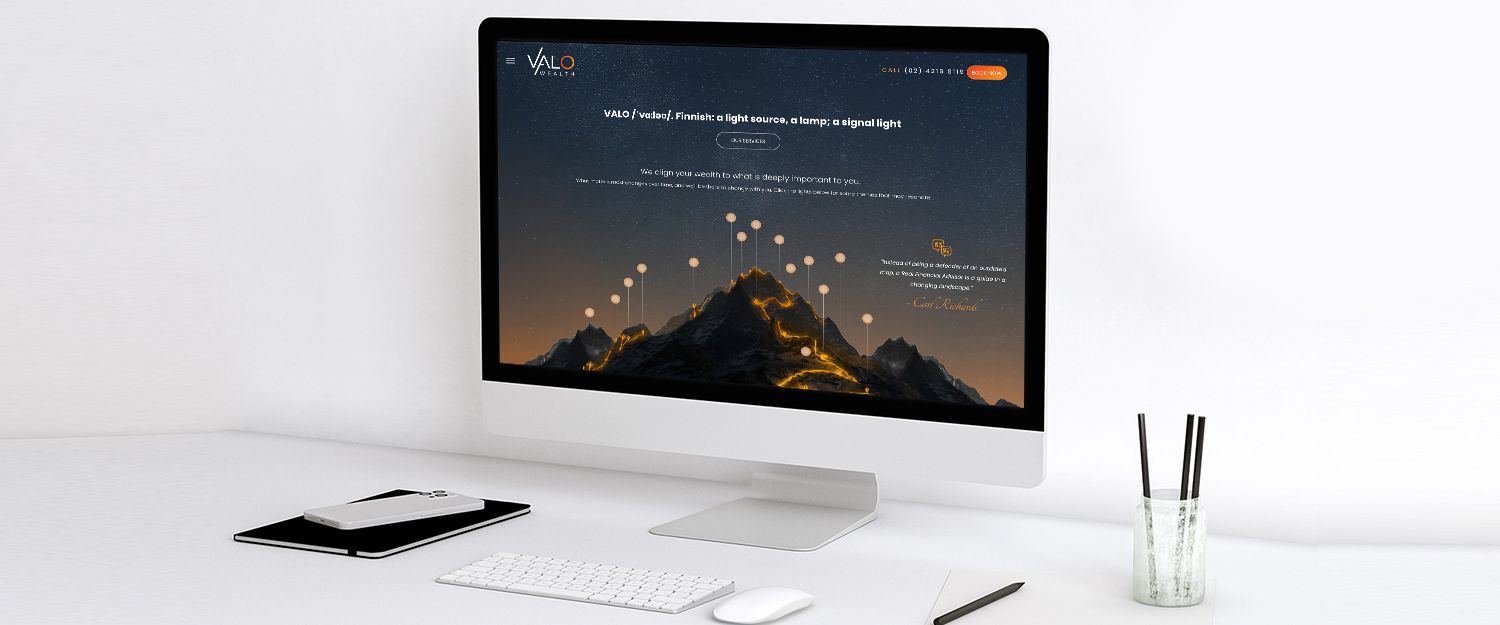
Valo Wealth
The Valo Wealth website exudes professionalism and sophistication, perfectly reflecting the brand’s expertise in financial services. The design uses a clean, modern layout with calming colours that instil trust and confidence. With intuitive navigation and clear calls-to-action, this site makes it easy for visitors to explore services and get in touch, showcasing how effective design can boost engagement.
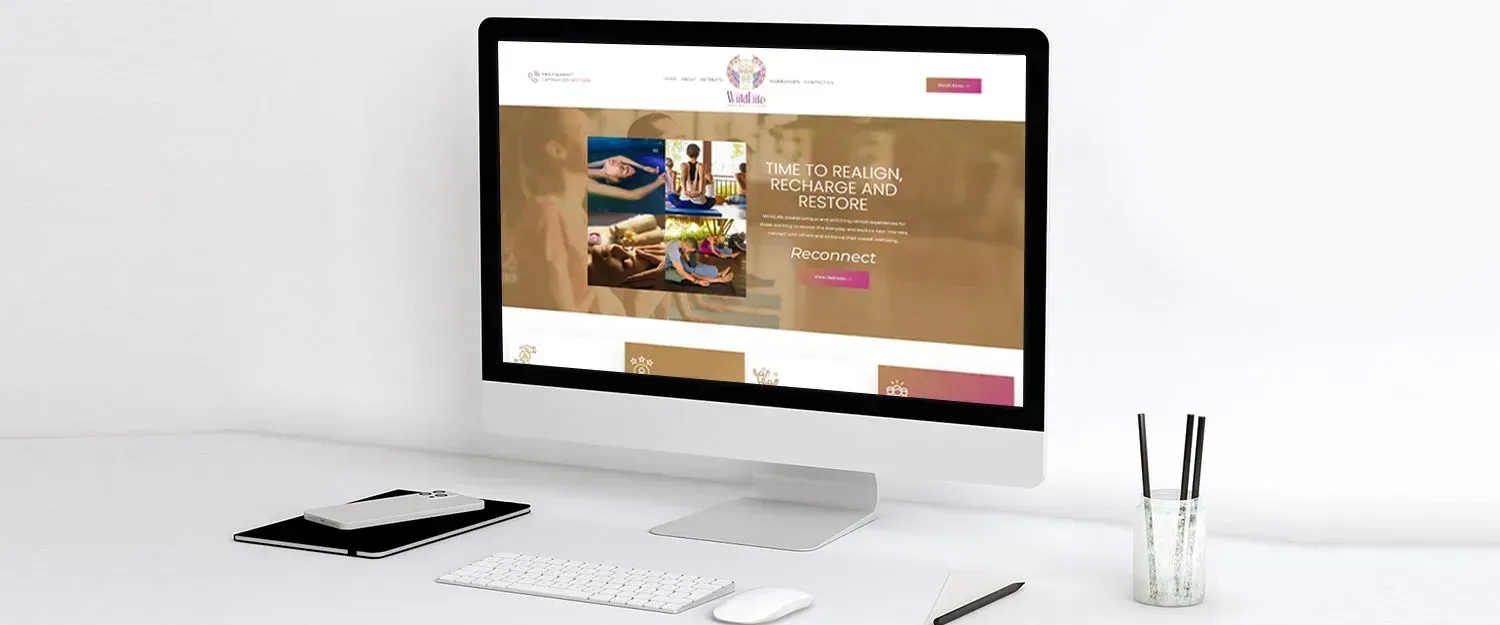
Wiildliife
For a brand that celebrates the natural world, Wiildliife’s website brings nature to the digital space. The site features bold, immersive visuals and a dynamic layout that captures the brand’s adventurous spirit. The design effectively uses whitespace, crisp imagery, and interactive elements to guide users through the brand’s story and product offerings. It’s a great example of how creative web design can enhance brand storytelling.
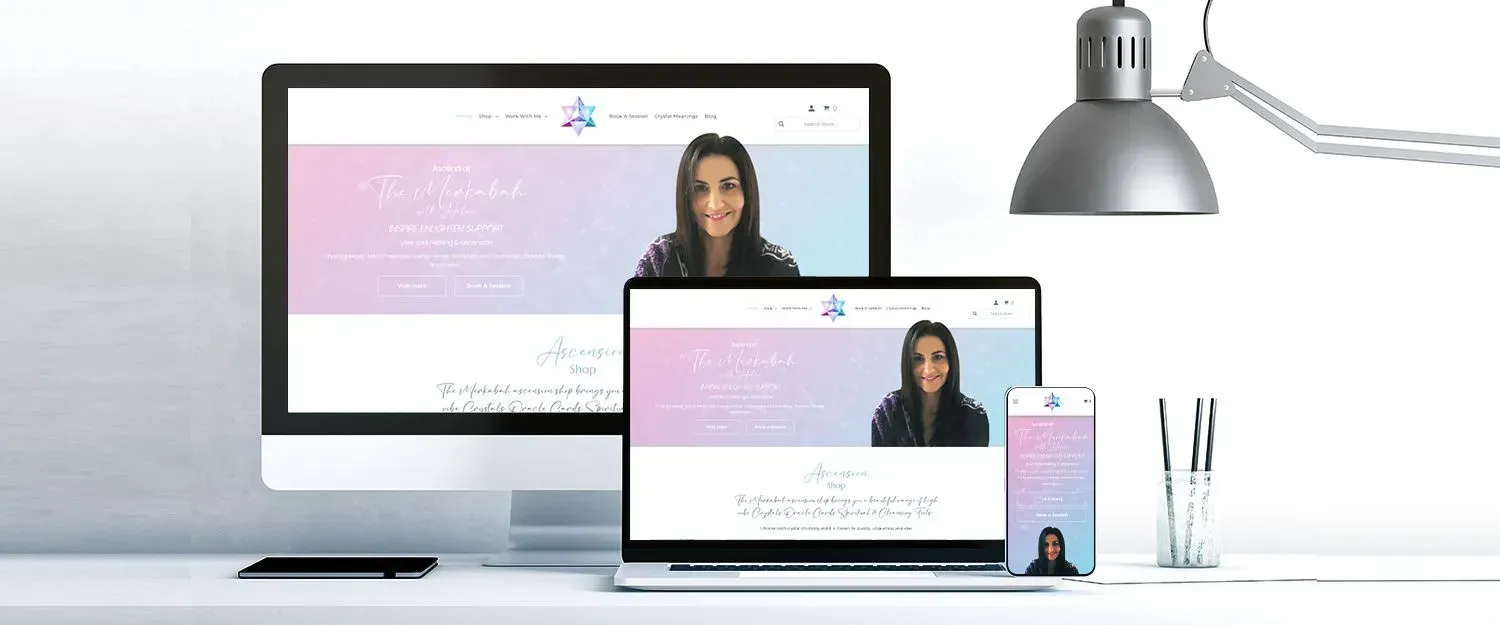
The Merkabah
The Merkabah’s website is a visually soothing and spiritually inspiring space. It combines soft, ethereal imagery with a user-friendly layout, making it perfect for a brand focused on holistic wellness and healing. The design invites visitors to explore at their own pace, with gentle transitions and thoughtfully placed content that enhances the overall experience.
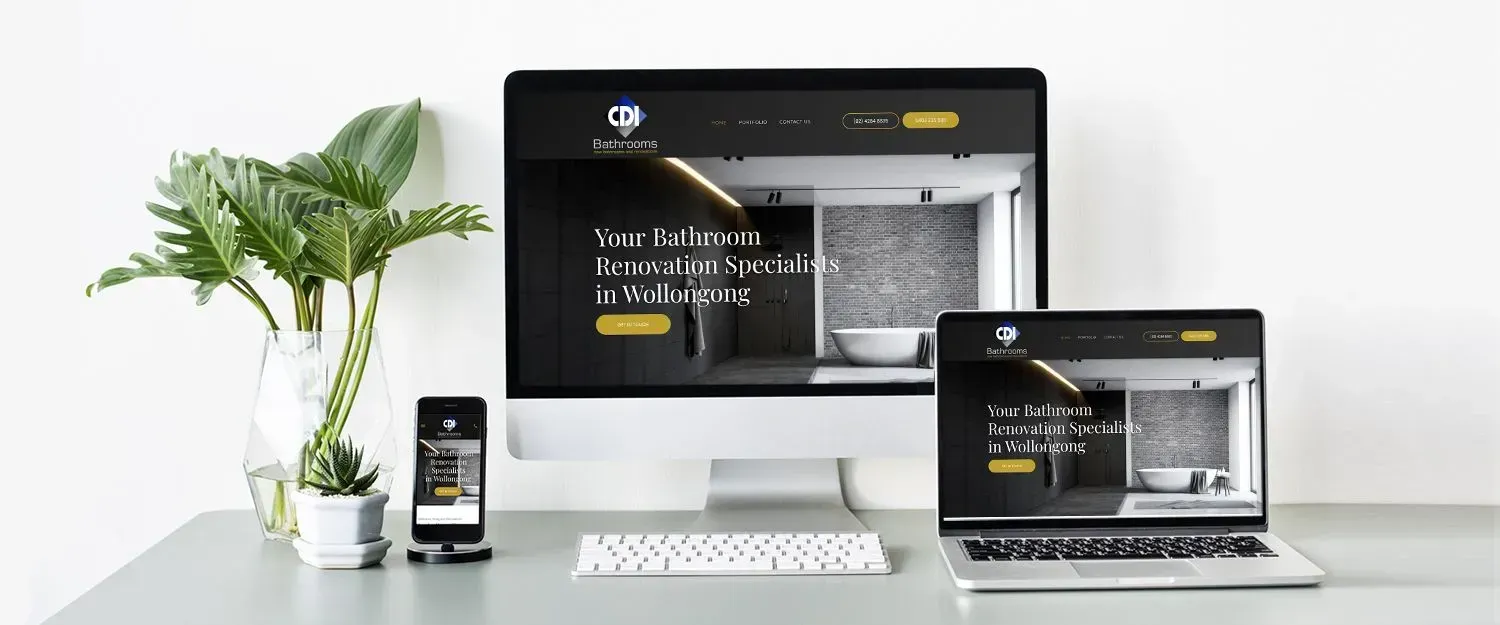
CDI Bathrooms
The CDI Bathrooms website showcases the brand’s craftsmanship through a sleek and practical design. With high-quality imagery of past projects and a straightforward navigation menu, the site strikes the perfect balance between style and function. Visitors can easily browse services, view portfolios, and request quotes, demonstrating how good design can effectively support business goals.
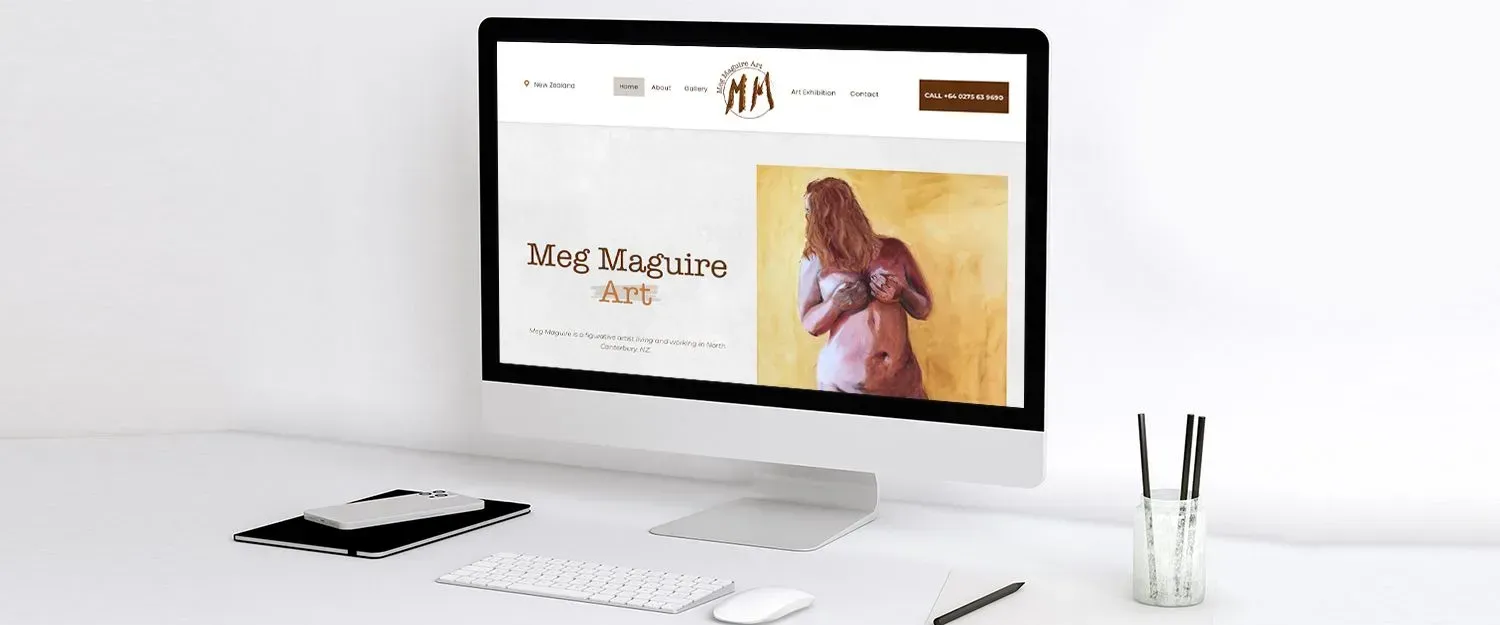
Meg Maguire Art
For Meg Maguire Art, Love My Online Marketing created a digital gallery that puts the artist’s work front and centre. The minimalist design allows Meg’s vibrant artwork to take the spotlight, while the simple layout makes it easy for visitors to explore collections and make purchases. The site also highlights how effective design can create an immersive experience that draws visitors into the artist’s world.
Common Mistakes to Avoid When Designing Your Website
Whether you're working on a new homepage design or revamping an existing site, avoiding these mistakes can make a huge difference in how website visitors interact with your brand.
Slow Loading Speeds
One of the biggest mistakes in website design is allowing your site to load slowly. In today’s fast-paced digital world, users expect a site to load within seconds—if not, they’ll likely leave and not return. Slow speeds can lead to high bounce rates, harming your site's performance and your brand's credibility. To avoid this, optimise images, use efficient coding practices, and enable browser caching. A well-optimised responsive web design not only improves speed but also ensures a smooth experience across all devices.
Cluttered Layouts
A cluttered homepage design can overwhelm visitors and make it difficult for them to find the information they need. Overloading pages with text, images, and ads creates a chaotic look that can drive users away. Instead, aim for a clean and organised website design with a clear visual hierarchy. Using white space strategically can help guide the user's eye to important elements, creating a more welcoming and professional look.
Unclear Call-to-Actions (CTAs)
Every website should guide visitors towards specific actions, whether it’s signing up for a newsletter, making a purchase, or contacting your business. However, if your CTAs are not prominent or use vague language, visitors may not know what to do next. To avoid this mistake, make sure your CTAs stand out visually, particularly on your homepage design, and use clear, action-oriented language like "Get Started," "Learn More," or "Buy Now."
Ignoring SEO Best Practices
Good website design goes hand-in-hand with search engine optimisation (SEO). Ignoring SEO elements like meta tags, keywords, and alt text for images can prevent your site from appearing in search engine results. This reduces your site's visibility and makes it difficult for potential visitors to find you. Implementing basic SEO practices not only improves your ranking but also enhances the relevance of your content, driving more organic traffic to your website.
Not Prioritising Accessibility
Accessibility is a critical aspect of website design that is often overlooked. A well-designed site should be accessible to all users, including those with disabilities. This means incorporating features like alt-text for images, keyboard navigation, and readable fonts. Accessibility improvements not only help a wider audience engage with your website but also demonstrate your brand’s commitment to inclusivity and usability.
Using Low-Quality Images
The images you use on your website contribute significantly to how professional and trustworthy your brand appears. Low-quality or irrelevant images can harm your credibility and reduce the overall appeal of your design. Always use high-quality, optimised images that load quickly and support your brand's message. Incorporating high-quality digital design elements can elevate your site’s appearance and create a more polished look.
Overuse of Pop-ups
Pop-ups can be a useful tool for capturing leads or promoting offers, but overusing them can quickly become annoying. If visitors are bombarded with pop-ups the moment they land on your website, they are more likely to leave. When using pop-ups, be strategic—ensure they add value and display them at appropriate times, such as when a user is about to exit or after they’ve spent some time on a page.
Forgetting Analytics
A beautiful website design means little if you don’t track how users interact with it. Analytics tools, such as Google Analytics, provide valuable insights into visitor behaviour, showing which pages perform well and which need improvement. Without analytics, you are essentially guessing what works and what doesn’t, which can lead to missed opportunities for optimisation. Regularly reviewing analytics can guide updates to your website design, helping you create a better user experience.
Neglecting Contact Information
One of the biggest mistakes businesses make when designing their website is neglecting to include clear and accessible contact information. Imagine a potential customer is ready to reach out or make a purchase, but they can’t find your phone number, email address, or contact form. Frustrating, right? This simple oversight can lead to lost sales and missed opportunities.
Clear contact information builds trust and credibility with your audience. It shows that your business is legitimate and approachable.
Takeaway
Designing a website that is both creative and simple doesn’t have to be complicated. By focusing on clear goals, prioritising simple navigation, using clean and consistent website design elements, and avoiding common mistakes, you can build a site that not only looks fantastic but also performs well. The key is finding the sweet spot where creativity enhances the user experience without overwhelming or confusing your audience.
If you’re ready to take your website design to the next level, Love My Online Marketing is here to help. Get in touch with us today to learn more about our comprehensive web design services and start building a website that truly represents your brand while delivering real results.

Love My Online Marketing has 10+ Years of working alongside businesses and helping them grow. Discuss your options for online success from website Design and Development through to Google Marketing.
Do you want more traffic and business leads?
Love My Online Marketing is determined to make a business grow. Our only question is, will it be yours?

































